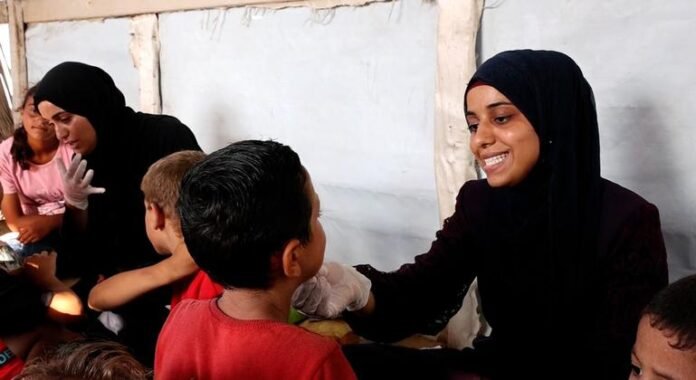In a simple tent set up in a makeshift camp for displaced people, west of the town of al-Zabida in Gaza’s Deir al-Balah province, speech therapist Amina al-Dahduh treats children whose lives have been upended by the deadly war and the massive devastation.
He is helping these children regain the confidence to speak.
A large number of terrified people and young children are unable to express their feelings as the war rages around for almost a year.
“The most common problem that has been revealed is stuttering,” says Amina Al-Dahdouh.
He estimates that 6 out of every 10 children currently attending the camp suffer from some form of speech disorder.
At this shelter for displaced families fleeing repeated Israeli attacks, their medical services are in high demand.
He said, “Currently in this camp I am treating more than half a hundred children suffering from speech problems. Besides, people from other camps also want to get their children treated here. I see patients here three days a week. Now I will provide additional three days of service to treat children in other camps as well.”
On October 7, 2023, Israel began bombing Gaza following attacks on Israel by Palestinian armed groups led by Hamas.
About 1,200 people were killed in the Israeli attack. More than 40,000 Palestinians, including a large number of women and children, have died in more than 11 months of Israeli bombardment in Gaza, according to the Gaza-based Ministry of Health.
Parents surrounded by various problems
According to Amina Al-Dahdouh, parents struggling for food, water and livelihood during this time of war cannot pay much attention to their children’s speech problems.
Although children are the most affected, Amina al-Dahdouh said, speech disorders are seen in people of all ages in the Gaza Strip. Perhaps their full assessment will be possible after the war is over.

fear of war
Amal Awad, the mother of one of the girls, told UN News that her daughter Fatima had started showing signs of difficulty speaking since the war began.
He said, “Now he can’t even pronounce letters, can’t even speak.”
He said that in the early stages of the war, he stopped talking out of fear. He was silent most of the time. As I tried to talk to her more, I found that she was mispronouncing letters.
She said her daughter has improved a lot since Amina Al-Dahdouh started treatment. “Even the people living in the tent next to us noticed the improvement in his speech.”
The United Nations has repeatedly warned of the long-term effects of war, including on children’s mental and physical health.
Jonathan Croix of the United Nations Children’s Fund, UNICEF, said in February (2024), “Before the war, UNICEF estimated that more than 5 million children in the Gaza Strip needed mental health and psychosocial support.”
Current estimates suggest that more than one million children need this assistance.

